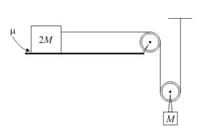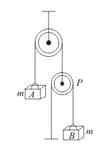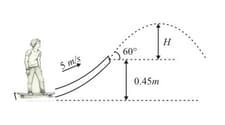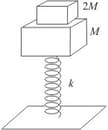B M Sharma Solutions for Chapter: Work, Energy and Power, Exercise 58: CONCEPT APPLICATION EXERCISE 8.4
B M Sharma Physics Solutions for Exercise - B M Sharma Solutions for Chapter: Work, Energy and Power, Exercise 58: CONCEPT APPLICATION EXERCISE 8.4
Attempt the practice questions on Chapter 8: Work, Energy and Power, Exercise 58: CONCEPT APPLICATION EXERCISE 8.4 with hints and solutions to strengthen your understanding. PHYSICS For Joint Entrance Examination JEE (Advanced) Mechanics I solutions are prepared by Experienced Embibe Experts.
Questions from B M Sharma Solutions for Chapter: Work, Energy and Power, Exercise 58: CONCEPT APPLICATION EXERCISE 8.4 with Hints & Solutions
In the figure, an inextensible string that connects two bodies of mass and , passing over a fixed smooth pulley. The body slides along a smooth vertical rigid bar. If the body is released from the given position, find the maximum distance raised by body .
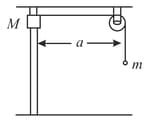
Two smooth balls of mass and connected by a light inextensible string are at the opposite points of horizontal diameter of a smooth semi cylindrical surface of radius . If is released, find its speed at any angular distance moved by .
A spring-mass system fall freely from a height before colliding inelastically with the ground. Find the maximum value of so that block will break off the surface. Assume stiffness of the spring.
In an ideal pulley particle system, the mass is connected with a vertical spring of stiffness . If the mass is released from rest, when the spring is deformed, find the maximum compression of the spring.
The figure below shows two blocks of masses and , respectively. The coefficient of friction between the block of mass and the horizontal plane is . The system is released from rest. Find the velocity of the block of mass , when the block of mass has moved a distance towards the right.
In the figure shown, the system is released from the rest. Find the velocity of the block when the block has fallen a distance . Assume all pulleys to be massless and frictionless.
In the figure shown, a skateboarder is moving at along the horizontal section of a track that is slanted upward by above the horizontal at its end, which is above the ground. When he leaves the track, he follows the characteristic path of projectile motion. Ignoring friction and air resistance, find the maximum height to which he rises above the end of the track.
In the fig shown, a block of mass is attached to the spring and another block of mass has been placed over it. The system is in equilibrium. The block are pushed down so that the spring compresses further by . System is released.
(a) At what height above the position of release, the block of mass will lose contact with the other block?
(b) What is maximum height attained by above the point of release?




